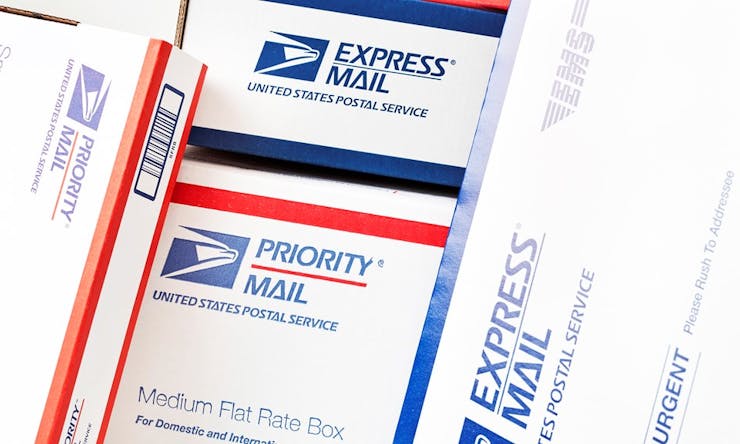Top takeaways:
- No. It’s federally illegal to mail weed
- People are doing it all the time. But don’t do it. The USPS seized 93,651 pounds of weed in 2019 alone
Hey, so we’d never do this, but people ask us all the time: “What is the risk of mailing or shipping weed or edibles through the mail?”
The short answer: mailing flower, edibles, vapes or any other cannabis product is federally illegal. Postal inspectors play a key role in helping wage the nation’s War on Drugs, including cannabis. As one of the country’s oldest law enforcement agencies, they work to identify and prosecute major drug mailers and intercept illegal drug proceeds that traffickers attempt to send through the mail.
But we know what you’re thinking: How many of those billions of packages being mailed each year contain cannabis? Are people getting away with mailing cannabis? Can I mail weed and not get caught? Is it worth risking the consequences? The long answer is a little more complicated, and we’re here to break it down.
- Potential penalties for mailing weed
- Mailing hemp and delta-8 products
- What about mailing weed through private couriers like UPS or FedEx?
- What happens when USPS or FedEx finds weed in packages? Are there penalties?
- What makes a package suspicious?
- What about mailing edibles, cartridges, and concentrates?
Potential penalties for mailing weed
Though states can legalize marijuana possession under local law, possession for any reason outside limited research technically remains a federal crime, as does shipping cannabis through the mail. Additionally, as a government agency, the United States Postal Service is subject to federal law; any illegal use of their services is a felony. Plus, marijuana is still a Schedule I drug.
That means anything under 50 grams can potentially get you up to five years in a federal penitentiary, and the penalties only increase as the amount grows. We should also note that even if you did not mail the package and are only the recipient, your knowledge and participation in the planning of the shipping makes you just as guilty as the person who mailed the package. Once a package is seized, a person is liable to face prosecution in both the state in which it was mailed as well as the state in which it was delivered. It’s totally at the discretion of the prosecutor. It’s easy work for cops in the Midwest and South to bust inbound boxes from the West Coast.
Mailing hemp and delta-8 products
With the passing of the 2018 Farm Bill came the federal legalization of hemp and hemp-derived products, which are defined as having less than 0.3% THC. Hemp products can be mailed legally within the United States by the USPS as well as private mailers like FedEx and UPS, though there are some exceptions, such as vaporizers, and legality depends on if the sender or delivery state has laws in place that prohibit it.
According to the USPS:
Hemp and hemp-based products, including cannabidiol (CBD) with the tetrahydrocannabinol (THC) concentration of such hemp (or its derivatives) not exceeding a 0.3 percent limit are permitted to be mailed in domestic mail only when: The mailer complies with all applicable federal, state, and local laws, and plans approved by the USDA under 7 CFR Part 990 pertaining to hemp production, processing, distribution, and sales; and The mailer retains records establishing compliance with such laws and plans, including laboratory test results, licenses, or compliance reports, for no less than 3 years after the date of mailing. Shipments of hemp and hemp-based products, including cannabidiol (CBD), are prohibited in international mail including items for delivery to overseas military and diplomatic Post Office addresses (APO, FPO, and DPO).
USPS
Now you might be thinking that the rise of delta-8 THC, a hemp-derived cannabinoid with intoxicating effects that differs from delta-9, offers a loophole. You can extract it from federally-legal hemp plants, so you should be able to ship it anywhere in the country, right? Well, no. Delta-8’s legal status currently exists in a gray area; while the DEA has listed it alongside delta-9 THC on its scheduled substances list, it hasn’t been officially scheduled as such, yet.
The law around mind-altering hemp products changes by the week in the US.
What about mailing weed through private couriers like UPS or FedEx?
In terms of alternative carriers within the US, there are a number of private couriers. The big three outside of USPS are FedEx, UPS, and DHL. A discerning cannabis shipper might ask “Which service should I choose and are any of these a better, safer option than USPS?” Surely these private companies offer the paying customers greater protection against government interference and warrantless searches?
FedEx, UPS, and DHL all specify in their terms of service that they reserve the right to open and inspect any package at their own discretion.
The answer is a resounding no. FedEx, UPS, and DHL all specify in their terms of service that they reserve the right to open and inspect any package at their own discretion. They all also specify that shipping any form of marijuana remains illegal and “unacceptable.” When you drop your package off at the FedEx or UPS store to be mailed, you’re putting the property into the possession of a third party, and the Supreme Court has ruled that giving your package to a third party “removes any reasonable expectation of privacy.” We should note that none of these couriers’ policies explicitly address delta-8 products.

FedEx
According to their terms and conditions, FedEx not only prohibits the mailing of cannabis flower and THC products, but also hemp plants, oil, and seeds. Compliant CBD products, however, can now be shipped.
UPS
UPS similarly prohibits shipping any cannabis products, but it does allow for raw hemp plants and CBD products that comply with state and federal laws (minus vapes), as long as they are shipped domestically and do not come from companies who also produce or handle marijuana or THC products.
DHL
DHL accepts packages containing hemp plants and derived products with under 0.3% THC, but only within the US. While DHL claims to inspect 100% of their packages, they and other couriers are not required to x-ray all shipments.
The USPS seems like the safest bet
In contrast to these policies, the US Postal Service seems like the preferred carrier for many drug shippers because it offers more stringent Fourth Amendment protection. Postal inspectors must acquire a search warrant based on probable cause before inspecting mail and parcels. According to the USPS:
“…first class letters and parcels are protected against search and seizure under the Fourth Amendment to the Constitution, and, as such, cannot be opened without a search warrant.”
However, although postal inspectors do have to obtain a warrant to search a suspicious package, suspicion alone is enough to get parcels singled out and tracked. USPS actively encourages workers and the public to get involved in the identification of packages containing drugs by offering $50,000 to anyone who provides information that leads to the arrest and indictment of a drug trafficker.
When it comes right down to the illegal transportation of cannabis via mail, USPS is—relatively!—your safest bet. And we mean relatively. Remember, the act is an illegal one and, without a doubt, carries a significant level of risk.
What happens when USPS or FedEx finds weed in packages? Are there penalties?

Crunching the numbers, the Postal Service faces an enormous task in preventing the trafficking of illicit substances. Put simply, the sheer volume of packages the carrier handles every day offers the chance that contraband packages will get delivered unchecked; the United States Postal Inspection Service enforces over 200 laws with over 1,200 inspectors. They can put their collective shoulder to the wheel, but no matter how hard they try, it is virtually impossible for the USPS to catch all wrongdoers. In 2015 alone, they seized 34,000 pounds of marijuana from mailed packages.
For third party couriers, the onus of responsibility falls on them to report illicit packages to the authorities, who can acquire warrants and open investigations. Without reported data, it’s impossible to estimate how many packages found to contain marijuana or other scheduled substances have been cited to open investigations.
Shipping drugs through the mail probably seems safer than it should be. The USPS, as well as partnering law enforcement agencies, simply don’t have the resources to try to figure out where the drugs are coming from and who’s expecting them.
However, it would be unfair to fault the USPS in the matter; they are just not equipped to x-ray and investigate each package, nor is there an official x-ray policy. Not only are packages given extra protection, as we’ve outlined, but the agency has also been losing money pretty much every year for the last decade due to a decrease in mail volume. The increasingly under-resourced organization faces increasing pressure to downsize, exerted by the government.
In 2016, despite turning a profit in a financial quarter for the first time in five years, President Obama still proposed the agency slash 12,000 employees in his fiscal 2017 budget. The Trump-appointed and current Postmaster General, Louis DeJoy, has made further cuts to plant locations, office hours, and mail delivery times.
Does where I’m mailing the weed to impact the risk?
In short, no. Since the USPS operates on federal law, it remains illegal and risky to mail cannabis and cannabis products anywhere in the US, including out of the country, state to state, and within a state, even if medical and/or adult-use laws are in place. Like third party couriers, the USPS does ship compliant hemp-derived products within the US if state laws allow, and most states allow the shipping of delta-8 products.
What makes a package suspicious?
Post inspectors have a long list of signs and tells that help them determine if a package could contain marijuana or other illicit substances. In fact, in 2016 the USPS founded the Administrative Non-Mailability Protocol (ANP) program, which “does not require postal inspectors to obtain search warrants to open detained packages.” In fact, if a package is detained and they don’t receive a response form the mailer or addressee in 21 days, the package is considered abandoned and they can open it anyway. Factors that raise suspicion with packages include:
- Outdated, handwritten or missing return addresses
- Odd shapes
- Excessively taped
- Excessive postage
- Leaking unidentifiable substances
- Excessive odor
What about mailing edibles, cartridges, and concentrates?
Unfortunately, if it’s got any THC above 0.3%, any cannabis-derived edible, cartridge, concentrate, and even topical can be seized and even used as proof of a drug-trafficking crime. Even CBD and delta-8 vapes are prohibited, though CBD and delta-8 edibles and concentrates that comply with federal and state regulations are allowed.
This post was originally published on July 26, 2016. It was most recently updated on May 18, 2022.





